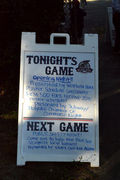Roosevelt visited on eve of Great Depression
Guest viewpoint
JOHN LOCKWOODThe Great Depression began with the collapse of the U.S. stock market in October 1929, its effects growing into a global disaster over the next few years.
By the time of Franklin D. Roosevelt's first inauguration as U.S. president on March 4, 1933, one in three Americans didn't have a job. Coincidentally, then-Gov. Roosevelt of New York state was in Springfield as the market began its plunge.
One of the first signs that all was not well with the speculative economy of the 1920s came on Oct. 24, 1929, "Black Thursday." The banner headline of the Oct. 25 edition of the Springfield Daily Republican said it all: "Stock Avalanche Overwhelms Market."
A further sharp drop occurred on Oct. 28, 1929, "Black Monday" (not to be confused with the Black Monday market crash of Oct. 19, 1987), and again the next day, "Black Tuesday." As it happened, Roosevelt was in Springfield on Black Monday, the 28th. He had been invited by the Western Massachusetts Democratic Club to appear at a dinner in his honor at the Hotel Kimball.
Roosevelt arrived at the station at 3:05 p.m., attended a reception from 4 to 5 p.m., spoke just before the dinner, and then left at 6:17, citing the need to be back in Albany to work on the state budget.
His speech was low-key, even conciliatory, as he spoke of the need for two strong parties, and how it was unhealthy for both party and public if any one party held on to a public office for too long, with no alternation of parties.
Although Roosevelt did not remind his audience, everyone knew the Republicans had won the past three presidential elections.
Roosevelt also refused to exploit the news coming in from Wall Street: "Last week occurred a serious loss to hundreds and thousands of citizens who dealt in securities on the stock exchange. Not one Democrat in public life has charged the responsibilities of this loss to the president of the United States, just because our president happens to be a Republican."...
Valley Blue Sox open season with 4-0 win over Keene Swamp Bats
|
View photos from all around the Pioneer Valley! |










